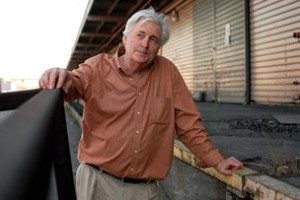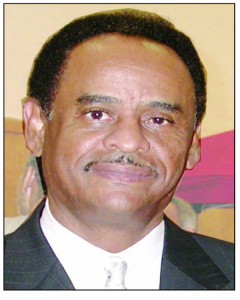Army Base Project Overcomes “Almost Insurmountable” Obstacles
Nov 29, 2013
By Ken A. Epstein
Now that the Oakland City Council has approved the $25 million, 17-acre development to build a parking and services center for trucks adjacent to the Port of Oakland, the project seems like an obvious win for everyone.
Who can argue with a development that supports thousands of truckers who are necessary to the functioning of the port, creates 900 permanent and construction jobs and improves air quality for Oakland neighborhoods plagued with off the charts asthma rates?
However, behind the good feelings expressed at the near unanimous vote at last week’s council meeting, the final passage of Bill Aboudi’s Maritime Support Services (OMSS) project was the result of years of bitter conflict and tortuous negotiations that are indicative of the state of the democratic process in Oakland and the kind of nearly insurmountable obstacles many small businesses must overcome to do business in the city.

Opposed to the project were the Teamsters, who only have a toehold among port truck drivers and want to organize them into the union. They have been portraying Aboudi as anti-worker.
About 90 percent of the trucks that are registered to service the port are owned by independent operators. Only about 10 percent work for big companies, and of these, about 100 are members of the Teamsters.

In addition, Tagami and some city staff seemed bent on pushing Aboudi out of business in their rush to make way for the Oakland Global development at the port, according to observers. The way the city has written its agreements, if for some reason Aboudi fails to sign a lease by Dec. 4, the property and project would go to Tagami.
What some people say is that the city essentially gave Tagami an economic incentive not to be anxious to work with the administration and council to reach an agreement with Aboudi.
In the face of the intense lobbying and opposition, Councilmembers Larry Reid, Desley Brooks and Rebecca Kaplan were unwavering in their support for the project.
The new members of the City Council, who started in January, had a particularly hard time sifting through the long history and various allegations against OMSS and personal attacks on Aboudi.
According to many observers, one of the new councilmembers, District 3 Councilmember Lynette McElhaney, stood out as one who did the research, listened to all the sides, learned the issues and worked hard to make sure the conflict could be resolved.
She is credited with being instrumental in finally convincing the Teamsters to drop their opposition to the project.
McElhaney says her foremost interest was in keeping the trucks off the streets of West Oakland, and she discovered that Aboudi had been doing that. She also learned that most of the charges against Aboudi and OMSS were false or extremely exaggerated.
“The allegations made against OMSS are not true and harmed that man,” she said. “West Oakland has suffered, and the city has had to pay additional costs on this project, as people kept organizing against allowing it to move forward.”
“It is not the purview of this council not to do business with a company that won a competitive bid,” she said.
McElhaney said that a number of community leaders and organizations, particularly Brian Beveridge and Margaret Gordon of West Oakland Environmental Indicators Project and Steve Lowe of West Oakland Commerce Association, played a major role backing the project and helped bring her up to speed on the development’s convoluted history.
A long-term problem at the port has been the indifference of city and port officials to truckers and the key role they play at the port, as officials focused almost exclusively on pushing ahead on their moneymaking development project, said Lowe, vice president of the West Oakland Commerce Association.
Officials failed to develop a transition plan that took into account the needs of truckers and West Oakland residents, who want to keep polluting trucks out of their neighborhoods, he said.
Officials also seemed to have no interest in retaining local companies at the port, even though they fit in with future plans for developing port-related business.
One company that left was Bay Area Kenworth, a $60 million business that sold and repaired trucks and planned to move from diesel to LNG (natural gas) fuel.
“They couldn’t make a deal with the city, so they moved to San Leandro,” Lowe said.

“In all the exchanges with the city and the port, the idea of business retention was given short shrift. They should have been thinking of ho are we going to retain the businesses we have and how can we work together to do it,” said Lowe.
“The port and the city were negligent in caring for their tenants.”